Scottish Art News
Latest news
Magazine
News & Press
Publications
Grace Ndiritu: Compassionate Rebels in Action at Dundee’s Cooper Gallery Review
21.11.2025
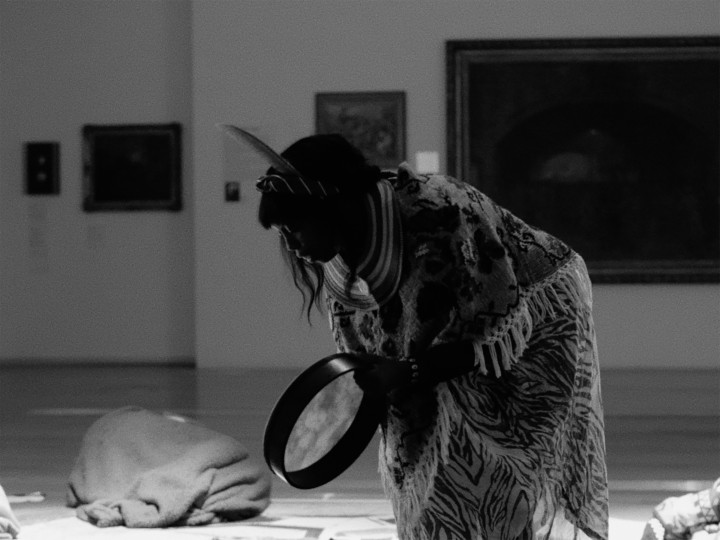
By Shalmali Shetty.
A glimpse of the red posters on the Cooper Gallery DJCAD’s entrance doors hints at something larger brewing within. Visitors leave their footwear at the threshold and step barefoot onto soft carpeted floors, as if entering a home or a kind of sacred space. Washed in red light, the room is covered floor-to-ceiling in black-and-white digital prints of photographs, while one mirrored wall absorbs and refracts the scene, suddenly giving the space the charged atmosphere of a club. Eyes adjust and figures emerge on the walls: of women in protest, solidarity, friendship, community, celebration, anger, resistance, compassion, emancipation. They ripple and multiply into a dizzying crowd, and among them, audiences are reflected in the mirrors, embodying a sense of resistance, revolution and time.
Compassionate Rebels in Action is conceived by award-winning British-Kenyan (Maasai Kikuyu) artist, filmmaker, and writer Grace Ndiritu to mark Sit-in #5 of the Ignorant Art School’s Five Sit-ins towards Creative Emancipation. Drawing on her upbringing in a family of anti-apartheid and feminist activists, she combines her artistic practice with years of esoteric and meditative learnings, giving the exhibition both a political and spiritual dimension. In 2012, Ndiritu initiated her project Healing the Museum, developing methodologies to reactivate museum spaces she viewed as “dying”. Through what she terms “non-rational methodologies” involving practices of shamanism and meditation, she reimagines the “birth of a new museum” as a site of social practice and sacred transformation. Her approach through radical pedagogy, community engagement and practices of care and healing offers a proposed pathway towards a holistic form of activism amid the ongoing human and environmental crises shaped by exploitative global politics. These ideas have shaped her artistic and pedagogical work for over two decades.
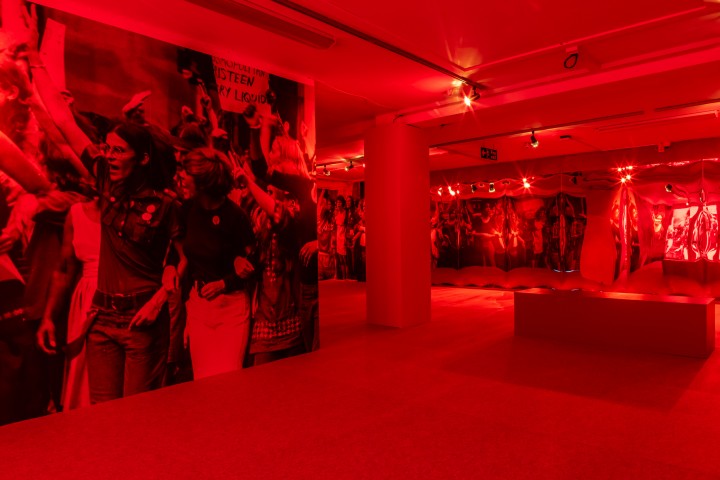 Grace Ndiritu: Compassionate Rebels in Action exhibition at at Cooper Gallery DJCAD.
Grace Ndiritu: Compassionate Rebels in Action exhibition at at Cooper Gallery DJCAD.
Through installations, photography, film, video, textiles, performance, and a reading room set within intentionally curated and specifically designed architectural spaces, she channels the Bauhaus concept of the gesamtkunstwerk, or the “total artwork”. Moving from the darker, more active space below, the exhibition ascends into more contemplative rooms marked by a restrained palette of reds, greys, blacks, and whites. Each space encourages not just looking, but sensing: an invitation to move with awareness, to inhabit the space and engage with the idea of embodied living.
This continues in the installation of ‘Protest Carpets’ (2021-23): three large circular woven carpets on the floor and four on the walls. Printed on them are archival images capturing moments of assembly such as the protesters at the land rights rally for Aboriginal people (Canberra, 1972); the women’s liberation movement in Washington, DC (1970) followed by Roe v. Wade, alongside other images. Aligned with her concept of “sitting together”, the carpets are positioned before a large wall projection playing two of her documentary-style videos about community groups. Reflecting on these histories, Ndiritu observes the cyclical nature of progress with many past social and political victories being undone in the current climate, yet insists there is still room for healing and transformation. Meanwhile, she stresses the importance of honouring the ancestors, just as future generations will look back on what we leave behind. The awareness of lineage is both an energetic and ethical practice for her.
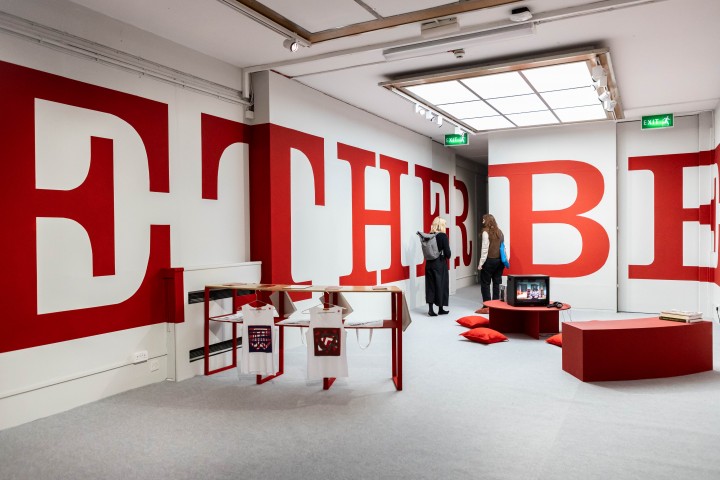 Study room at Grace Ndiritu's Compassionate Rebels in Action exhibition at Dundee’s Cooper Gallery.
Study room at Grace Ndiritu's Compassionate Rebels in Action exhibition at Dundee’s Cooper Gallery.
In stark contrast to the other spaces, a brightly lit study room features large red letters spelling “Being Together” across its walls, reminiscent of a commercial storefront. A display table presents merchandise from Ndiritu’s eco-fashion brand Coversult, which engages with themes of democracy, race, and class through collaboration with local communities. Alongside this sits a collection of research and reading materials, including Ndiritu’s red book ‘Glossary for Art and Action’ (2025) - a subversion of Mao’s ‘Little Red Book’ (1964); compiling 50 terminologies coined or adopted by her since the year 2000 that chart her conceptual thinking. They line the walls, while a small monitor plays a four-hour looped video of Ndiritu’s selected interviews. Ndiritu reflects on the hierarchies of learning that often relegate spiritual knowledge to the margins, noting that it is frequently dismissed as the “lowest form.” Her practice counters this hierarchy by drawing from her experience of living for years in rural, alternative landscapes with indigenous, off-grid, spiritual and tribal communities, from First Nations and other Native American groups to Osho in India, Hare Krishna movements, and centres like Findhorn and Samye Ling in Scotland. These experiences charge her work, creating a space where knowledge, spirituality, capitalism, and politics intersect; and is a reflection of her ongoing negotiation between institutional art commitments and her engagement with grassroots, community-centred practices.
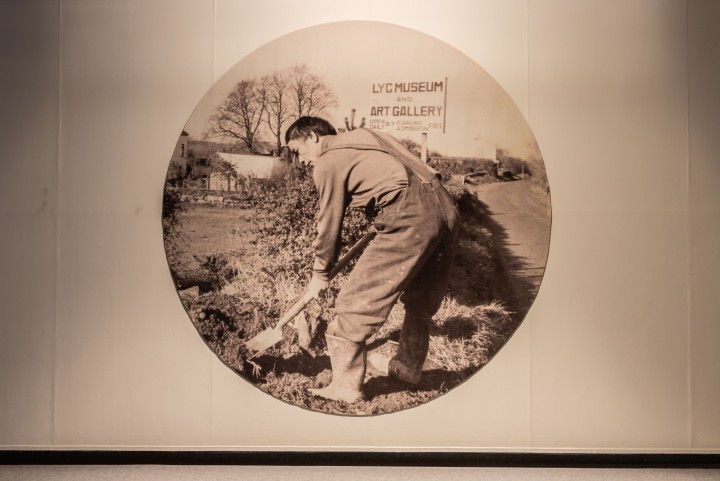 Archival image of rural labour at Grace Ndiritu's Compassionate Rebels in Action at Cooper Gallery DJCAD.
Archival image of rural labour at Grace Ndiritu's Compassionate Rebels in Action at Cooper Gallery DJCAD.
This exhibition marks the fifth and final chapter of the Ignorant Art School initiated in 2020 by Sophia Yadong Hao, Director and Principal Curator of Cooper Gallery, DJCAD. Conceived as an experimental framework, the project has, through two surveys and three exhibitions, explored the potential of arts pedagogy and alternative modes of learning, functioning as a parallel art school beyond conventional curricula. Across its five sit-ins, it has questioned not only how we learn, but what we define as knowledge within structures shaped by colonialism, capitalism and the state. From its outset, it has challenged hegemonic, Eurocentric definitions of learning, what Hao describes as “non-rational, counter-narrative thinking”, that is embodied also in Ndiritu’s practice. Hao notes that previous collaborations with groups such as Womanifesto (Thailand) and GUDSKUL (Indonesia) have expanded its exploration of how alternative pedagogies can challenge power, hierarchy, and the status-quo.
The Ignorant Art School draws on thinkers and movements that radically reimagine the foundations of education - amongst them Jacques Rancière’s ‘The Ignorant Schoolmaster’ (1987), which through five lessons argues for dissolving classroom hierarchies and learning through doing, and offers education as a site of critical inquiry and intellectual emancipation rather than mere transmission of knowledge. Equally significant is Gayatri Chakravorty Spivak’s notion of unlearning, which positions ignorance not as an absence but as radical openness with a potential for new possibilities. Added to this is the vision of the Bauhaus, where Walter Gropius in the 1919 Manifesto asserted that its aim was not to impose a fixed style or system but to remain flexible and responsive to evolve with the times. Hao reflects on how these ideas define the Ignorant Art School’s approach to knowledge as a social and collaborative process, where artistic practice functions as a form of radical pedagogy and learning is continually redefined through collective action. It is further informed by historical struggles and their practical, subversive tactics that has enabled communities to recognise their transformative potential.
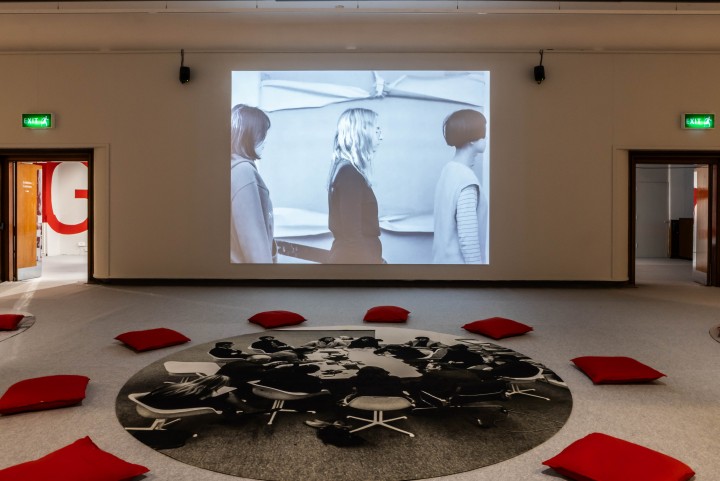 A collective viewing space at Grace Ndiritu's Compassionate Rebels in Action exhibition at Cooper Gallery.
A collective viewing space at Grace Ndiritu's Compassionate Rebels in Action exhibition at Cooper Gallery.
Over the course of the exhibition, A Season of Peace Building has been formulated as a series of sit-ins and workshops, inviting participants to explore ways of living, feeling, designing, sitting, writing, decolonising, growing, and eating together. The accompanying launch of Ndiritu’s book ‘Being Together: A Manual for Living’ (2025), extends these ideas through contributions from other practitioners into a guide of experiments. These interventions leave a residue beyond the exhibition for us to leave and live with, together.
As the Ignorant Art School edges towards its conclusion, Hao is considering ways it might be carried beyond its five sit-ins. Reflecting on the facilitators involved across the programme, many from global majority contexts, she recognises how their invaluable perspectives have shaped a curriculum outside dominant cultural frameworks; one she hopes might metamorphose into a social practice project, functioning as an alternative art school sustaining a non-Eurocentric approach.
Grace Ndiritu: Compassionate Rebels in Action, an exhibition and season of events as part of The Ignorant Art School, Sit-in 5. Presented until 13th December.




